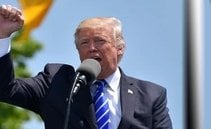Donald Trump’s advance raises important questions among stock market operators. What impacts could the tycoon’s re-election have on global financial markets?

After defeating the former governor of South Carolina, Nikki Haley, in the New Hampshire Republican primaries, Donald Trump, former president and renowned American businessman, takes a significant step towards his first goal: the third consecutive nomination as presidential candidate of the Republican Party.
This development does not go unnoticed on Wall Street, sparking a mixture of excitement and concern and influencing the performance of global stock markets. While the year of the "global command revolution" continues in this direction, the stock markets, at the moment, appear to be unwilling to interrupt their rise.
However, now everyone is starting to wonder: how would global stock markets react in the event of Donald Trump’s definitive victory?
How come we’re talking about Trump again?
The primaries are a crucial moment in the candidate selection process for the presidential elections in the United States. In particular, the New Hampshire primaries are of considerable strategic importance. As one of the first states to hold primaries, New Hampshire offers candidates a valuable opportunity to demonstrate their appeal to voters and gain momentum for later stages of the campaign.
A victory in this primary, especially for a Republican candidate, represents a significant indicator of popular support within the state, influencing not only public opinion but also media coverage nationwide. Recently, although the Republican National Committee did not confirm Donald Trump as the official candidate for 2024, his figure continues to attract attention globally, especially on Wall Street. Many are wondering about the impacts that so-called "Trumpism" could have on the dynamics of global stock markets, marking a period of intense speculation and interest in the financial and political world.
2024 will be a crucial year for stock markets
2024 promises to be a year of great liveliness and uncertainty, not only due to the presidential elections in the United States but also due to the speed with which global dynamics can evolve. This year has been labeled the year of "political change", a significant period in which over four billion people, approximately half the world’s population, are called to the polls in approximately sixty countries. The importance of these events is reflected in the fact that the decisions made in this election will influence approximately 40% of global gross domestic product.
The highlight of this electoral cycle will be the presidential elections in the United States. November 5, 2024, is a date to mark in the calendar as the "big day", in which an interesting scenario could emerge: a possible challenge between the current president Joe Biden and a potential return of Donald Trump. This prospect is already attracting global attention, with multiple speculations about how it could affect not only American politics but also financial markets and international relations.
The consequences of a Trump victory on the financial markets
In the economic sphere, numerous challenges could affect global markets. By focusing on specific US economic variables, rather than political or geopolitical aspects, it is possible to develop an in-depth analysis of the impact on financial markets. First of all, a crucial factor that could influence a possible election of Donald Trump is inflation. If inflation is not adequately controlled, it could transform from a monetary policy objective to a political tool.
Moving on to “Trumpism,” a notable aspect of a possible Trump presidency is his proposed “tax cut 2.0.” The reduction in corporate tax rates could have a direct impact on the markets, offering new growth prospects for companies, in particular for small capitalizations represented by the RUSSELL 2000 index, which was negatively affected during the Biden administration, recording from January 20, 2021, a negative performance of almost 10%.
In sector terms, the defense sector could emerge as another potential winner and this is a much-discussed opinion in the media these days. Lockheed Martin companies, which have already benefited from significant appreciation in recent years, could react positively to the return of Trump, who is known to favor defense spending.
The banking sector also looks promising. While the Biden administration favored increasing capital requirements for banks, Trump has historically favored easing those restrictions. This has led to growing interest in US regional banks, which will be particularly hard hit by market crashes in 2023.
These issues were also at the center of discussions at the World Economic Forum in Davos. Prominent Wall Street figures such as Jamie Dimon, CEO of JPMorgan Chase & Co., have highlighted that during Trump’s presidency, the US economy has done "pretty well." This type of analysis highlights the importance of economic policies in influencing global markets and long-term growth prospects.
What is happening in the stock market?
The possibility of Donald Trump’s return to the presidency of the United States seems to be already considered by the market, with a considerable advance notice of approximately nine months. This is evident in the strengthening of the dollar in recent stock market sessions, a phenomenon that occurs despite expectations of lower interest rates. This trend reflects the prevailing opinion on Wall Street.
A further signal is the increase in yields on US Treasury Bonds. At the same time, an appreciation of the RUSSELL 2000 index is observed, which, although subtle, could be attributed to the increase in the media visibility of Donald Trump.
Interestingly, beyond political considerations and support for Trump or Biden, the market seems to be moving in a rather clear direction. Regardless of the election outcome, it is clear that political developments have a direct impact on market behavior.
Original article published on Money.it Italy 2024-01-29 11:58:00. Original title: Se Trump vince le Elezione USA 2024, cosa succede in Borsa?






